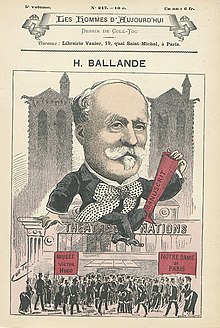Hilarion Ballande
Jean-August Hilarion Ballande (* 1820 in Cuzorn , Lot-et-Garonne department ; † January 26 or 27, 1887 near Bergerac , Dordogne department ) was a French actor , playwright and theater director .
biography
Although he came to Paris very young, he kept his strong southern accent, which he never lost. Ballande first studied pharmacy, but then switched to the conservatory. He made his debut at the Odeon in 1843 , in a character created especially for him in Shakespeare's Lucretia . He excelled in performing in different pieces on one day. The successes of the performances were rather moderate.
In 1849 the artists of the Odeon got together and took over the business of the theater. Ballande became the second managing director and co-partner. He was supposed to be appointed director in the same year, but could not get his way. Then he went on an overland tour with which he also had success. The political unrest in the wake of the Second French Republic made him fear not inconsiderable amounts of his shares and he also withdrew financially from the Odeon. With this reserve Ballande was able to write his first piece, Mémoire , and in 1850 knocked on the door of the Théâtre Francais with it . It was a mediocre piece that didn't go down well. As a result, he joined an acting company that performed not only in France, but also abroad. Towards the end of 1857, the actor Ballande disappeared from the public and he turned to writing plays.
A little later the name Ballande reappeared in the Parisian public. However, not as an actor, but as the author of pieces in poetry and dramas, which were performed in the Théâtre de la Porte Saint-Martin , among others . In 1867 Ballande tried to found the Société de patronage des auteurs dramatique inconnues to promote unknown authors, but the planned event in the Salle des Concerts Herz was a one-off event and was not continued.
In Ballande, the idea of organizing a performance every Sunday morning, at which a recognized expert on classical theater art was to give a reading at a reading, matured. He called the event Matinées littéraires . This should be followed by a panel discussion about the respective writer and his forgotten pieces. Nobody wanted to hold this event, it was even described as foolish, and Francisque Sarcey , who was to lead the first performance, also canceled . 1869 Finally, he carried out his project on his own, in the Théâtre de la Gaîté . He succeeded in engaging well-known names such as Henri Dupont-Vernon , Jules Claretie , Sarah Bernhardt , Agar and many more. Sarcey was also to make up for his participation later. In 1872 the Académie française awarded him an award which was associated with a not inconsiderable donation of money. The success of his matinees also prompted other theater operators to give Sunday mornings, which had not previously been available in all of Paris.
In 1873, after the Franco-Prussian War , Ballande tried to establish a series of events on Molière , including a museum, in the Salle Ventadour , but this failed and cost him a lot of money.
The competition to his matinees had meanwhile become too great and Ballande gave up disillusioned. He finally bought the Théâtre Déjazet in 1876 and pompously named it Troisième-Théâtre-Français (third theater in France). He could only fill the theater by handing out free tickets. It was only when he switched to the Théâtre des Nations in 1880 that he achieved the desired success. He stayed there until 1883, when he retired and from then on wrote poems and contributions to small journals. However, in 1885 he took over the post of director of the Théâtre des Nations, which he held until his death.
A few months before his death, he was awarded the Academic Palms . Ballande died on January 26 or 27, 1887 at Château de la Finou near Bergerac .
Stage plays (in verse)
- Mémoire , 1849
- Châteaux en Espagne , 1861
- Les Grands devoirs , 1865
- Une femme , 1867
- Une Prière à notre Saint Père le Pape
more publishments
- La parole: ou l'art de dire et d'exprimer , 1868
- Report à Son Excellence Monsieur Maurice Richard, ministre des Sciences, lettres et beaux-arts, sur les matinées littéraires et sur la Société de patronage des auteurs dramatiques inconnus , 1870
- Jubilée de Molière du 15 au 23 May 1873 organisé au Théâtre-Italien par M. Ballande Musée Molière, cataloque , 1873
literature
- Henri Lyonnet: Dictionnaire des comédiens français, ceux d'hier: biography, bibliography, 1912, p. 68 ff. ( Digitized )
Web links
- Information on Hilarion Ballande in the database of the Bibliothèque nationale de France .
- Literature by and about Hilarion Ballande in the WorldCat bibliographic database
| personal data | |
|---|---|
| SURNAME | Ballande, Hilarion |
| BRIEF DESCRIPTION | French playwright |
| DATE OF BIRTH | 1820 |
| PLACE OF BIRTH | Cuzorn |
| DATE OF DEATH | January 27, 1887 |
| Place of death | Bergerac |
